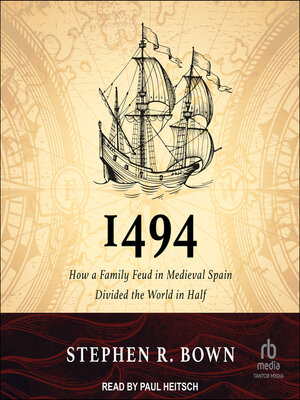1494
audiobook (Unabridged) ∣ How a Family Feud in Medieval Spain Divided the World in Half
By Stephen R. Bown

Sign up to save your library
With an OverDrive account, you can save your favorite libraries for at-a-glance information about availability. Find out more about OverDrive accounts.
Find this title in Libby, the library reading app by OverDrive.



Search for a digital library with this title
Title found at these libraries:
| Loading... |
When Columbus triumphantly returned from America to Spain in 1493, his discoveries inflamed an already-smoldering conflict between Spain's renowned monarchs, Ferdinand and Isabella, and Portugal's João II. Which nation was to control the world's oceans? To quell the argument, Pope Alexander VI issued a proclamation laying the foundation for the Treaty of Tordesillas of 1494, an edict that created an imaginary line in the Atlantic Ocean dividing the entire known (and unknown) world between Spain and Portugal. Just as the world's oceans were about to be opened by Columbus's epochal voyage, the treaty sought to limit the seas to these two favored Catholic nations. The edict was to have a profound influence on world history: it propelled Spain and Portugal to superpower status, steered many other European nations on a collision course, and became the central grievance in two centuries of international espionage, piracy, and warfare. The treaty also began the fight for "the freedom of the seas"-the epic struggle to determine whether the world's oceans, and thus global commerce, would be controlled by the decree of an autocrat or be open to the ships of any nation-a distinctly modern notion, championed in the early seventeenth century by the Dutch legal theorist Hugo Grotius, whose arguments became the foundation of international law.






